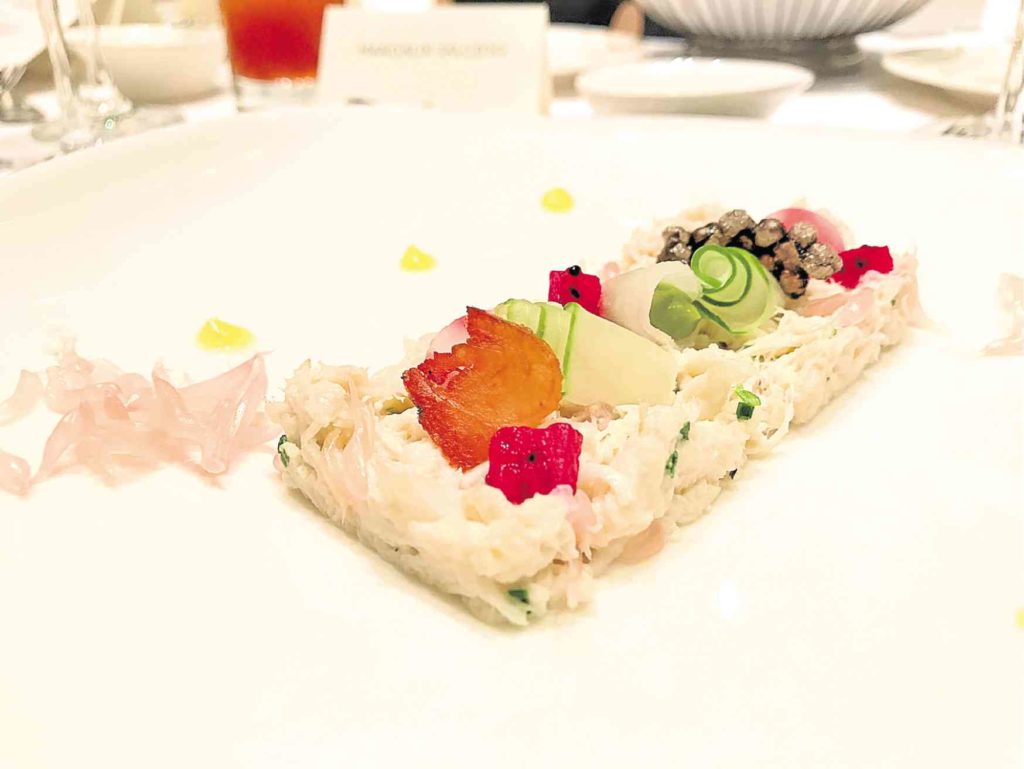The World Wide Fund for Nature, formerly called World Wildlife Fund, or WWF, held a benefit dinner last Wednesday entitled Sustainable Food, Sustainable Future.
The five-course dinner brought together eight chefs from popular restaurants in the metro today: Makati Shangrila’s Eric Weidmann, Hey Handsome’s Nicco Santos, Gallery Vask’s Chele Gonzalez, Black Sheep’s Patrick Go, Grace Park’s Margarita Fores, The Test Kitchen’s Josh Boutwood, and for dessert Le Petit Souffle’s Miko Aspiras and Gourmandise’s Sunshine Puey.
Through the ingenuity of these chefs, the evening celebrated ingredients sourced from farms around the country, some already supported by WWF.
Locally sourced, world-class
The show opened with a beautiful starter by Weidmann: a tartare using smoked tanguige and blue crabs, accented with bits of grapefruit. It was an elegant introduction and very Shangri-La-worthy.
This was followed by a sophisticated creation by Santos using the same crabs. Santos creatively gave the bowl character using lemongrass but added a sour kick using fermented santol skin. Then, like a smooth DJ, he balanced the acidity using coconut. As another breaker, he served the dish with a cracker, and this time infused with katsuobushi. Then just to make the bowl pretty, he accessorized the crabs with some cosmos and basil flowers. This, for me, was the finest example of how our local ingredients can be elevated to cuisine that is modern and competitive on a global scale.
For the mains, Gonzalez partnered with Go to serve a very savory yellowfin tuna with adlai.
Meanwhile, Fores partnered with Boutwood to serve the finale of pork: humba that used a pineapple glaze, to emphasize that the pork used is sweet because the pigs were fed with local pineapples.
The most impressive, though, was that the ingredients were all locally sourced. The pork was from a local farm while the blue crabs were from the Northern Guimaras Strait. (Imagine, all this time we only looked to Guimaras for those perfectly sweet mangoes!)
The tuna was from a WWF partner community in Mindoro Occidental. Luz Baskiñas, WWF vice president for project development, came over to our table and explained that the tuna—excellent quality, by the way—was from Mamburao, a community where the fisherfolk still practice handline fishing.
To help the community, WWF gave training sessions on how to handle the fish and eventually export these. They are also trying to get the fish from this area certified through the Marine Stewardship Council. This will help certify the quality of the fish in the area and help buyers recognize the value of the product.
Zero waste
For dessert, Aspiras had the idea of using excess food from the Shangri-La buffet. Indeed, instead of all this food going to waste, why not create something not only edible but also delectable? Puey, on the other hand, used old brie cheese trimmings and foie gras to create a gorgeous red foie gras lollipop. This eye-catching pass around had glaze that was thickened with pectin created using over-ripened apples and day-old muffin chips. You would never think the ingredients were from “leftover” buffet food.
There was a very important message attached to this creation. WWF president Joel Palma noted, “Despite poverty and hunger in many parts of the world, one-third of all food is wasted every year.”
Kitchens everywhere, whether in hotels and restaurants or in homes, need to change their habits to consciously avoid having food just go to waste. We may not feel it immediately or individually but this will have a great impact on reducing poverty and hunger.
Having attended the World’s 50 Best talks in Barcelona last June, where World’s Best chef Massimo Bottura emphasized his commitment to stop food waste, it was heartwarming to also see that our chefs are, in their own way, aligning with this advocacy. Bottura’s cultural revolution to stop food waste has clearly had a global impact and our chefs have chimed in.
Sustainable lifestyle
But the responsibility is not only upon the chefs to implement a sustainable lifestyle.
WWF chair Aurelio “Gigi” Montinola, who came up with the idea for the dinner, appealed to everyone to convert to a sustainable lifestyle.
He urged guests by highlighting the need to combat the threat of climate change. He also noted the need to stop over-consumption, saying this has a direct relation to poverty and world hunger. The world is simply consuming more than it can produce.
Alarmingly, Montinola noted the Philippines was third in the world for littering the ocean with plastics, killing our fish, on which millions of families depend.
“If we can convince you to modify your lifestyle to actively live sustainably, then individually and collectively, we will be helping preserve our planet for the next generation,” he said.
To “actively live sustainably” is easier said than done. It will require a major lifestyle change for many of us. But statistics—and everyday weather—show that having everyone live “sustainably” is something that is not only important but is now also extremely urgent.
Indeed, even without the fancy dinner, we are very much convinced.
For info, visit wwf.org.ph. For donations and other inquiries, call Dan Ramirez, WWF Communications Manager at +639175987740.
